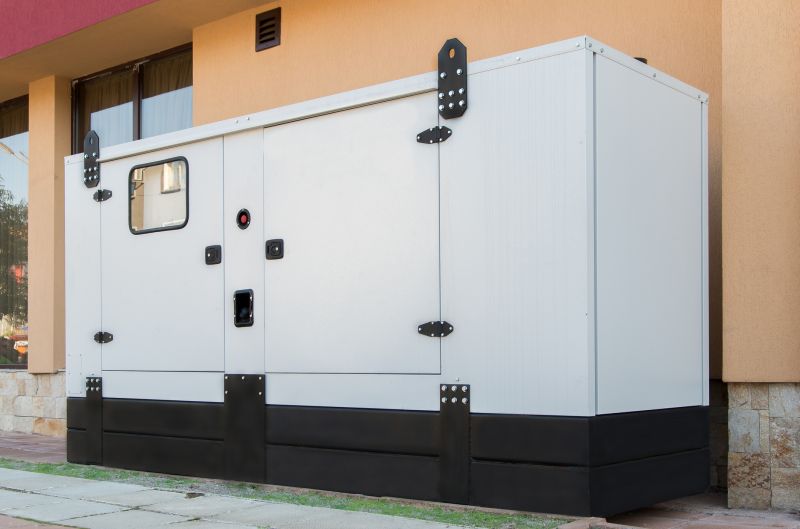Essential Products For Standby Generator Installations To Ensure Safety and Efficiency
Identify critical products that help you install your standby generator safely while optimizing its performance.
 Standby generator installations require a variety of products to ensure safe, efficient, and reliable operation. From transfer switches to mounting hardware, each component plays a vital role in the overall system. Selecting the right products involves understanding the specific power needs of your property, the compatibility with your chosen generator, and adherence to safety standards. Proper installation not only helps in maintaining continuous power during outages but also ensures safety for both the property and the technicians involved.
Standby generator installations require a variety of products to ensure safe, efficient, and reliable operation. From transfer switches to mounting hardware, each component plays a vital role in the overall system. Selecting the right products involves understanding the specific power needs of your property, the compatibility with your chosen generator, and adherence to safety standards. Proper installation not only helps in maintaining continuous power during outages but also ensures safety for both the property and the technicians involved.
Top Overall Option
Automatic Transfer Switch
An automatic transfer switch is a central component in standby generator systems, enabling seamless power transfer during outages. It detects utility power loss and automatically switches the load to the generator, then back to utility power once stability is restored. This product type is designed for reliability and safety, often featuring durable construction and advanced circuitry to prevent electrical faults. Properly selected and installed, an automatic transfer switch can contribute significantly to the overall functionality of a standby power system.
Types of Products For Standby Generator Installations
Transfer Switches
Devices that automatically or manually switch the power source from utility to generator and back, ensuring safety and convenience.
Generator Connectors
Heavy-duty cables and connectors designed to link the generator to the transfer switch or electrical panel securely.
Weatherproof Enclosures
Protective housings that shield critical components from weather elements, prolonging lifespan and ensuring safety.
Mounting Brackets and Hardware
Sturdy brackets and fasteners that facilitate secure installation of generator components in various environments.
Fuel Delivery Systems
Fuel lines, tanks, and related accessories that supply consistent fuel to the generator for extended operation.
Vibration Dampers
Devices that reduce mechanical vibrations, minimizing noise and preventing damage during operation.
Grounding Kits
Components used to properly ground the generator and electrical system, ensuring safety and compliance.
Transfer Switch Boxes
Enclosures housing transfer switches, providing protection and easy access during installation and maintenance.
Conduit and Wiring
Electrical conduits and wiring harnesses designed for safe routing and connection of system components.
Battery Chargers and Accessories
Equipment to maintain generator batteries, ensuring reliable start-up during power outages.
Surge Protectors
Devices that safeguard the system from voltage spikes and electrical surges.
Remote Monitoring Devices
Systems that allow users to monitor generator status and performance remotely.
Load Management Modules
Devices that help distribute power efficiently across multiple circuits or loads.
Alarm and Notification Systems
Equipment that alerts users to system status changes or faults.
Cooling Fans and Ventilation Accessories
Components that help maintain optimal operating temperatures for generator units.
Installation Kits
Complete sets of tools and parts designed to facilitate proper setup and connection.
Popular Choices
Widely used for seamless power transfer during outages, suitable for various generator sizes.
Reliable cables designed to handle high current loads safely and efficiently.
Commonly chosen to protect critical components from environmental exposure.
Popular for secure installation in different environments, including residential and commercial sites.
Essential for extended generator operation, often selected based on capacity needs.
Frequently used to reduce noise and mechanical stress on the system.
Commonly installed to ensure system safety and electrical code compliance.
Increasingly popular for real-time system status updates and maintenance alerts.
Popular for safeguarding sensitive electrical components from voltage spikes.
Widely used to ensure reliable start-up by maintaining battery charge levels.
Standard components for safe and organized electrical connections.
Commonly installed to alert users of system status or faults remotely.
Popular for maintaining optimal generator temperatures during operation.
Favored for comprehensive setup solutions that streamline the installation process.
The core of a standby generator system is the transfer switch, which automatically detects power loss and switches the load from the utility to the generator. These switches come in various types, including manual, automatic, and split-phase configurations, each suited for different setups and preferences. Alongside transfer switches, durable wiring, conduit, and grounding accessories are essential to connect the generator safely to your property’s electrical system.
Additional products such as weatherproof enclosures, vibration dampers, and mounting brackets help protect components from environmental damage and ensure stable operation. Fuel delivery systems, including fuel lines and storage tanks, are also critical for maintaining continuous operation. When selecting products for installation, it is important to consider compatibility, durability, and ease of maintenance to support long-term performance and safety.
Key Buying Considerations
- Compatibility with your existing or planned generator model.
- Power capacity and whether it matches your household or business needs.
- Type of transfer switch (manual vs automatic) based on convenience and budget.
- Durability and weather resistance of enclosures and protective accessories.
- Ease of installation and availability of professional support or guidance.
- Quality and gauge of wiring and connectors for safety and longevity.
- Fuel type compatibility and capacity for extended operation.
- Grounding and safety features to prevent electrical hazards.
- Remote monitoring and alert features for convenience and maintenance.
- Compliance with local electrical codes and standards.
- Availability of spare parts and replacement components.
- Noise levels during operation, especially for residential installations.
- Vibration and shock resistance for outdoor or industrial environments.
- Cost versus long-term reliability and maintenance requirements.
- Manufacturer reputation and product warranty support.
This content includes affiliate links. We may earn a commission if you make a purchase through these links, at no additional cost to you.
